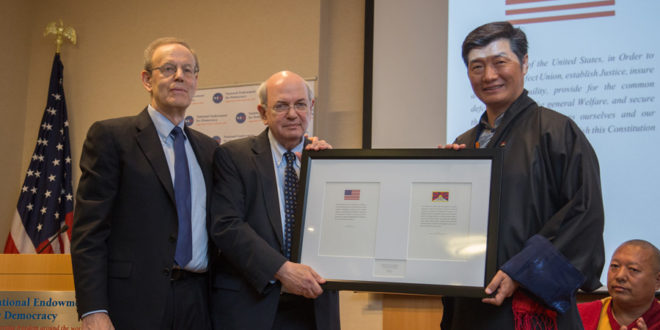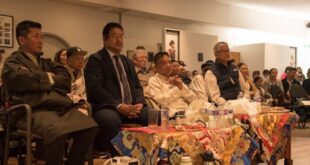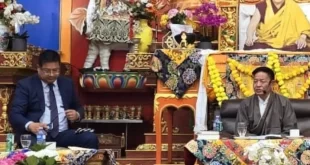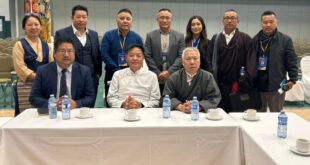WASHINGTON D.C.: The National Endowment for Democracy (NED) presented a citation to Sikyong Dr Lobsang Sangay on 15 June to recognise and honour the democratic accomplishments of the Central Tibetan Administration, as envisioned by His Holiness the Dalai Lama.
The citation – a framed copy of the US preamble on one side and an excerpt from the Central Tibetan Administration’s preamble on the other side – was presented to Sikyong by Mr Martin Frost, Chairman of the Board of Directors, NED, in the presence of His Holiness the Dalai Lama and other notable friends of Tibet including Leader Nancy Pelosi, Mr Richard Gere and senator Diane Feinstein.
“It’s the vision of His Holiness the Dalai Lama that we Tibetans have followed and implemented to establish a democratic system in exile,” Sikyong said as he accepted the citation. “This recognition and honour of Tibetan democracy will send a strong message of hope to the Tibetans inside Tibet and a message of solidarity to the Tibetan political prisoners,” he added.
Sikyong Dr Lobsang Sangay also spoke about the evolution of Tibetan democracy from the early years of Tibetan exile when His Holiness emphasised the formation of a democratic administration in the 1960’s to the year 2011 when His Holiness devolved all his political authority to an elected leadership. “His Holiness was 24 when he lost his country in 1959. In 1960, after coming into exile, His Holiness visited a group of Tibetan road construction workers at Dalhousie. His Holiness told the Tibetan crowd that we must have a modern democratic government,” Sikyong recalled.
“His Holiness was barely 24 at the time when he lost his country, but even at that tender age, he had a vision for democracy in exile. A democracy without borders. And in 1960 itself, Tibetans elected members of the parliament and the Tibetan parliament was formed,” he said.
He further underscored the strength of Tibetan democracy by highlighting the representation of women in the Tibetan Parliament, the highest lawmaking body, and the space for open discussion and debates on the issues facing Tibet.
He also explained the difficulties contained in the paradox ‘democracy in exile’. “Academically speaking, democracy in exile is seemingly impossible. Because when you are an exile community, you should be united in one goal i.e. to return to your homeland. In such a scenario, one leader is what you focus on. But in a democracy, you ought to have more than one leader, you got to have freedom of speech and instead of a single goal, you got to have diversity. So in an academic sense, there is a contradiction between exile and democracy,” he noted.
“However, we Tibetans have successfully implemented and embraced the concept of democracy in exile, as per the vision and guidance of His Holiness the Dalai Lama. As a result, the Central Tibetan Administration that we have set up, as chairman Martin Frost rightly said, is perhaps one of the most successful refugee organisations in the world now,” Sikyong asserted.
Mr Martin Frost, Chairman of NED board of Directors, in his remarks, expressed the admiration that the organisation have for the leadership provided by His Holiness the Dalai Lama to the Tibetan people. He also spoke about the success of the Central Tibetan Administration and its commitment to democracy.
“The Tibetan diaspora numbers about 1,50,000. The emergence of this strong, unified, tolerant and educated community didn’t happen by chance. And its success was neither predetermined nor guaranteed. To survive as a community in exile, it’s a challenge in the best of circumstances. But the Tibetan community under the leadership of His Holiness the Dalai lama and the Central Tibetan Administration has thrived.”
“The Tibetan diaspora, once housed mainly in the camps and settlements of India, is now global. Even after six decades of exile, Tibetans have retained a distinct sense of identity and community. There are many reasons to honour the Central Tibetan Administration but principal among them is the establishment of an effective and representative government. The CTA has grown significantly for the last 60 years. At the core of the CTA is a commitment to democratic values and institutions, electing members of parliament since 1960’s and directly electing the Sikyong since 2001,” he said.
“This recognition by NED is a symbol of our democratic solidarity with the Tibetan people,” he added.
NED also hosted His Holiness the Dalai Lama in the afternoon at a panel discussion with four young activists from Cuba, Sudan, Azerbaijan and Jordan to discuss the principles of democracy and hope.
The event also featured the presentation of the Democracy Service Medal in honour of the late Tibetan Buddhist Monk Tenzin Delek Rinpoche.




